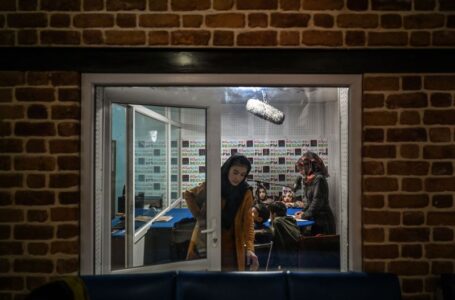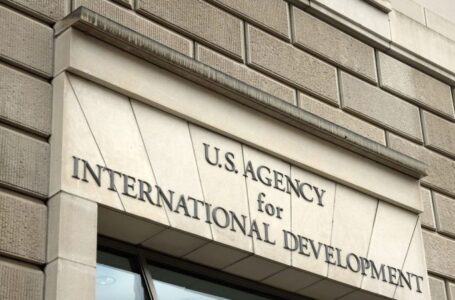Trump’s proposed US takeover of Gaza Strip elicits positive response across administration
Newborns die of hunger and mothers struggle to feed their children as Israel’s siege condemns Gazans to starvation


Anwar Abdul Nabi perches on the edge of a bed at the Kamal Adwan Hospital in northern Gaza. Her eyes are sunken with grief.
The young mother tenderly holds the fingers of her daughter, Mila. Just minutes ago, the 7-year-old girl died of starvation.
Israel launched its military offensive in Gaza after the militant group Hamas killed at least 1,200 people and kidnapped more than 250 others in southern Israel on October 7.
Since then, Israel’s attacks on Gaza have killed at least 30,717 Palestinians and wounded another 72,156 people, according to the Ministry of Health in the enclave, while its siege has drastically diminished vital supplies and left the enclave’s population of some 2.2 million people exposed to high levels of acute food insecurity or worse, according to the Integrated Food Security and Nutrition Phase Classification (IPC), which assesses global food insecurity and malnutrition.
At least 20 Palestinians have starved to death in Gaza, Dr. Ashraf Al-Qudra, a spokesperson for the Ministry of Health, said on Wednesday. The youngest baby who died of starvation in the enclave was one day old, according to Dr. Hussam Abu Safiya, director of Kamal Adwan hospital. The true number could be even higher, as limited access to northern Gaza has hindered the ability of aid agencies to fully assess the situation there. UN experts accused Israel of “intentionally starving” Palestinians in Gaza. Israel insists there is “no limit” on the amount of aid that can enter Gaza, but its inspection regime on aid trucks has meant that only a tiny fraction of the amount of food and other supplies that used to enter Gaza daily before the war is getting in now.
Children, mothers at risk
One-year-old Watin, in northern Gaza, has grown tired and weak from dehydration. Instead of drinking baby formula, she is surviving on one to two dates a day.
The babies of thousands of women “who are due to give birth in the next month in the Gaza Strip are at risk of dying,” the UNICEF State of Palestine Humanitarian Situation report said on Tuesday. At least 5,500 pregnant women “do not have access to prenatal or postnatal check-ups because of bombings and need to flee for safety,” the report said.
“Anxiety is also leading to premature births,” the report added, citing the United Nations Population Fund (UNPF.) The report also said over 90% of children “aged 6-23 months and pregnant, breastfeeding women face severe food poverty with access to two or fewer food groups per day.”
Food shortages are reportedly the worst in northern Gaza, where Israel concentrated its military offensive in the early days of the war. Child malnutrition in the region is about three times higher than in southern Gaza, according to the World Health Organization (WHO). Screenings at health facilities there have previously found at least one in six children under the age of two are acutely malnourished, said Richard Peeperkorn, WHO representative for the territory. He warned those figures are “likely to be greater today.” Pregnant and breastfeeding women also face “grave threats to their health” caused by malnutrition, the Global Nutrition Cluster, an alliance of NGOs, reported in February.
“There are babies who died in their mothers’ wombs, and surgeries were performed to remove the dead fetuses,” he said on Monday. “Mothers are not eating because of the conditions we are living in, and this affects the infants … There are causes of many children suffering from dehydration and malnutrition, leading to death.”
Israel’s bombardment has forcibly displaced at least 1.7 million Palestinians, according to the UN’s Office for the Coordination of Humanitarian Affairs. Many of those who fled the fighting are crammed into overwhelmed shelters without basic sanitation, leading to the spread of infections. Malnourished children, especially those with severe malnutrition, are at greater risk of dying from illnesses like diarrhea and pneumonia, according to the World Health Organization.
‘We have become like dogs’
On Tuesday, the United Arab Emirates and Egypt sent 42 tons of medical supplies and food via airplanes in the region, the Emirati Ministry of Defense said. The US military said it had, alongside the Royal Jordanian Air Force, parachuted more than 36,800 meals into northern Gaza that day.
But human rights groups criticized the drops as inefficient and a degrading way of getting aid to Gazans, urging Israeli authorities to lift controls on land crossings into the enclave. Melanie Ward, the CEO of the UK-based NGO, Medical Aid for Palestinians, urged Israel to “immediately open all crossings into Gaza for aid workers to assist those in need.”
“Only safe and unfettered access for aid and aid workers, the lifting of the siege, and an immediate ceasefire can end starvation in Gaza,” she said in a statement on Saturday.
Even when aid does make it into the strip, collecting it can be dangerous.
“We thank God that there is humanitarian aid being dropped from Jordanian and Emirati planes,” he said on Tuesday. “I try as much as possible to obtain milk from the planes that drop aid so that we can provide milk for my nieces for as long as possible.
“Planes are dropping aid on northern Gaza, and we have become like dogs, running after a bone.”











